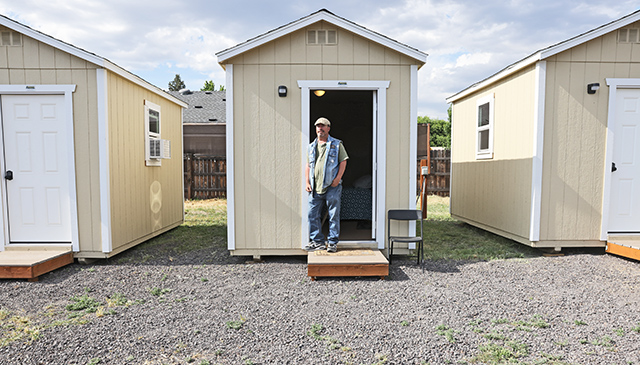Crops, hopes go dry
Published 5:00 am Sunday, May 13, 2001
KLAMATH FALLS This spring, a time for sowing, there is an idleness on the land.
From the unplowed fields to the empty canals to the working men with nothing to do but stand around awkwardly with their hands jammed in their pockets and worry and curse and stare out over the land and wonder what went wrong with America.
Quilts and candy.
It has come to this for Dick Carleton, 57, a man with strong hands whose family has farmed for generations, who has a master’s degree in mathematics and a wisdom about potatoes, whose $1 million debt is less than that of many of his neighbors, whose retirement was to be secured by farming revenue.
”I don’t know what we’ll do,” he said. ”I really don’t. My wife’s co-owner of a candy shop that’s doing well. And she quilts. We could open a little store.”
He paused.
Dick Carleton a farmer’s farmer, the backbone of America, a thinking man with dirt under his fingernails and the smell of hay on his clothes and a dog in the back of his battered pickup selling quilts and candy and potpourri from behind a counter in a city store.
”I don’t know,” he said. ”Bankruptcy’s in the picture. We’ll have to do something.”
In the spring, the snow drains from the Cascades and the low hills surrounding the Klamath Basin, a vast area of the High Desert and marshes on the Oregon-California border once known as the ”Everglades of the West.”
For eons, the snowmelt ran into shallow lakes and wetlands, the lifeblood of the Klamath tribes, fish and waterfowl, the skies darkening with millions of birds along the Pacific Flyway.
But for the past century, much of the water has been diverted into reservoirs and canals that nourished crops, cows, homesteaders and their descendants spread across a tapestry of family-owned farms and ranches.
No more.
The U.S. Bureau of Reclamation, which oversees the massive irrigation system here, cut off irrigation water last month to 90 percent of the farms in the basin.
The federal government cited the drought and endangered species concerns.
Environmentalists, tribes and commercial salmon fishermen said agriculture had monopolized water for too long, damaging water quality, stream flows, fish, birds, tribal culture and downstream fishing communities.
Despite years of water conflicts and shortages, the shut off stunned many farmers. Just weeks before the announcement, some farmers disbelieving the irrigation ditches would ever run dry planted fields and bought more irrigation pipes.
It was the first time their water rights were made secondary to fish, fishermen and tribes since the headgates opened in 1907.
”Incomprehensible,” Carleton said. ”It’s not about fish or tribes. It’s about betrayal. It’s a land grab.”
Klamath Falls, a city of about 20,000 people, is the basin’s hub, an increasingly diversified community that no longers depends entirely on agriculture.
But nearby are several towns like Merrill and Malin, Ore., and Tulelake, Calif., places of fewer than 1,000 people, where everyone knows each other and each other’s land, where people talk and walk and drive at a country pace, where the water towers and town hall American flags loom over the landscape where farming remains as important as a century ago.
Many people, primarily Hispanic farm workers who have lived here for years because of the steady work, have already departed. Many more are ready to follow. More layoffs are coming.
”It’s a nice place, but if there’s no work, we have to move,” said Guillermo Lopez, 35, a farm hand whose family came here from Mexico nearly a decade ago.
On a recent day, he sat in a pickup truck. He normally would be working from dawn to dusk on the Carleton farm. Today, he tossed some hay to the cows. His day’s work was done.
”It’s depressing,” said Lopez. ”There’s nothing to do.”
He laughed sadly.
”I help granny plant her garden, too,” he said.
He nodded to Helen Carleton, who in her 80 years has been a farmer’s daughter, wife, mother and grandmother, the matriarch of a family farm that covers nearly 1,000 acres. She lives on the homestead where she was born. She has white hair and the handshake of a young man.
Her son, Dick, and two grandsons, support her and other family members. They supplied 5 million pounds of potatoes a year to Campbell Soup, a $400,000 annual contract that put Carleton spuds in America’s clam chowder and vegetable beef soup for nearly two decades.
When the water stopped, they lost the contract.
”Our retirement is gone,” Dick Carleton. ”The same for a lot of people. It’s that simple.”
He laughed, a gallows humor.
”You know, it’d kill me to buy a bag of potatoes” at the grocery store, he said.
”I tell them not to worry,” Helen said, smiling. ”I planted two rows of potatoes in the garden.”
Jim Carleton, 33, one of the few farmers under age 40 in the Klamath Basin, became a farmer knowing the usual risks weather, low prices, pests, disease were worsening in today’s global agricultural economy. As a precaution, he got a college degree and an emergency medical technician’s certification.
Walking around the farm a sprawling place of weathered barns and high-tech tractors Jim Carleton knows his son, Cody, 6, likely will never be a farmer.
Farmers warn of another Dust Bowl and ghost towns and divorce and alcohol abuse and suicides. They predict a ripple effect that reaches beyond agriculture-related businesses to the restaurants, malls, movie theaters and gas stations a projected economic loss of $300 million to $500 million. The Carleton farm, a relatively modest operation, spent $1 million last year in the local economy.
Merrill could lose half its population by the end of the summer and soon be bankrupt as property values plummet to near worthlessness, said Carleton, a Merrill City Council member.
Farmers warn of a conspiracy by bureaucrats and environmentalists to use the Endangered Species Act to restrict agriculture across the West first, the spotted owl for logging, now the sucker fish and salmon for farming.
Environmentalists and fishermen have announced plans to sue the Bureau of Reclamation for allegedly jeopardizing endangered fish in the Snake and Columbia rivers an action that could restrict irrigation flows to farms in the Snake River basin in Idaho, Wyoming and Oregon.
Klamath farmers believe that if the conspirators succeed in their little basin, it will pave the way for an America-wide dependence on imported food of lower quality and higher prices.
Environmentalists say there is no conspiracy against farming.
”But, yes, there’s an effort to address water problems on a basin by basin basis,” including reducing, modernizing and relocating agriculture from sensitive areas and using water more efficiently to compete in today’s global markets, said Tim Stearns, a National Wildlife Federation spokesman.
Some farmers want as much water as their great-grandfathers got. Some will accept less but not a complete cut off.
”It’s disgusting,” said Dave Cacka, a farm movement leader. ”It’s bureaucracy run amok. They’re stealing private property.”
He stared out his kitchen window to the brown fields that should be greening with crops. There were dark circles under his eyes.
”There’s more to farming than monetary gain,” he said. ”It’s wonderful to plant a crop and watch it grow and harvest it and work the ground and leave it in better shape.”
He paused, then scowled.
”We’ve tried for eight years to negotiate, but we were stabbed in the back at every turn,” he said. ”I’m done with mediation.”
Cacka, one of 13 children, each of whom got a stake in the family farm, can not pay his debts. He cancelled his health insurance. But he’s one of the lucky ones: The bank is being lenient for now.
A fourth-generation farmer, he is glad he discouraged his boy from staying on the family homestead.
Today, his son is a successful computer manufacturer.
”But I’m almost 48 years old,” Cacka said. ”I’ve farmed all my life. What do I do now? Who’s going to hire me?”
It is late spring. Temperatures are over 80 degrees. The sky has no hint of rain. And the wind, ever present, swirls across the basin, working on the nerves of embittered people, worsening the boredom, whipping up top soil that beats at the eyes and windows and the home-made signs staked in the fallow fields: ”Old McDonald HAD a Farm,” ”Sucker Punched by the ESA,” ”For Sale.”
Some fields are green, but the crops, planted last fall, will soon die. At dusk, deer come down from the hills to forage in the fields and drink from the canals, but find little there. Fathers play catch with their sons in the yard. Women water their gardens. The sunset shines on the red barns and rusted equipment and potato sheds.
During the day, on front porches, street corners, Rotary Club lunches, there is near-constant discussion of the legal, bureaucratic, historic and moral minutiae of the water shut off, of promises of perpetual water broken, of urban America not understanding.
But a pointlessness creeps into the conversation after a few minutes people fall silent and toe the dirt or stare at their wilted salads and thoughts drift back to frustration.
On farm after farm, people are just passing time. Some put out phone calls, emails, letters and faxes to politicians. Others do odd jobs.
Men and women whose lives have been defined by hard outdoor labor, whose skin is sun-battered, whose work place and home place are the same, now reduced to trivial make-work chores to keep their minds busy, passing the time at lunch counters, tractor shops and barns, moods changing from fatalistic to Quixotic, from acceptance to outrage, and back again.
The Klamath Basin holds a potato festival each autumn. A celebration of the harvest, a barbecue, parade, American flags, patriotic music. For the first time since World War II, the potato festival likely will be cancelled.
Some banks are patient about loan repayments. Others are demanding money now.
”A lot of banks are saying don’t worry, but people are scared to death,” said farmer Rod Blackman. ”A lot of people are walking around in denial. They don’t know what to do.”
Although demonstrations have been peaceful, public rhetoric is becoming hard-edged. Federal agencies are called ”scumbags,” environmentalists ”eco-terrorists” and ”liars” and worse. Privately, the talk is increasingly rough. The Bureau of Reclamation office installed bullet-proof glass and electronic locks. The FBI and U.S. Marshal Service have been to town. Organizers said a May 7 bucket brigade was the ”last peaceful rally.”
”I won’t kid you,” Carleton said. ”Violence is a concern.”
Farmer Brent Cheyne, a big man with the speech and mannerisms of John Wayne, has an encyclopedic knowledge of farming in the Klamath Basin, all of which supports the restoration of irrigation water.
”All this other talk is gibberish,” he said. ”It makes you understand the saying: I love my country but fear my government.”
Farmer Steve Kandra, one of the leaders of the farmers, said: ”You can’t expect them to not come out fighting. I can’t control them anymore. It’s going to go. These are tough guys and they’re mad as hell. You got to give these people a reason to live.”
Nancy Kandra, his wife, often awakens at 2 a.m.
She thinks about their bills piling up, their retirement gone, living off their children’s college savings, her father’s recent death, her mother-in-law needing Alzheimer’s care, their alfalfa farm drying up when Upper Klamath Lake, the basin’s primary irrigation reservoir, is full.
Sometimes, she cries.
”It’s not an easy thing,” she said. ”We’re living on will power.”
She regained her composure. She shook her fist.
”By God, we’re right,” she said. ”We have to get America’s attention. These farmers are law-abiding, God-fearing people. For Christ’s sake, something bad has happened to good people here. We’re losing a piece of this community every day. We have to prevail.”






